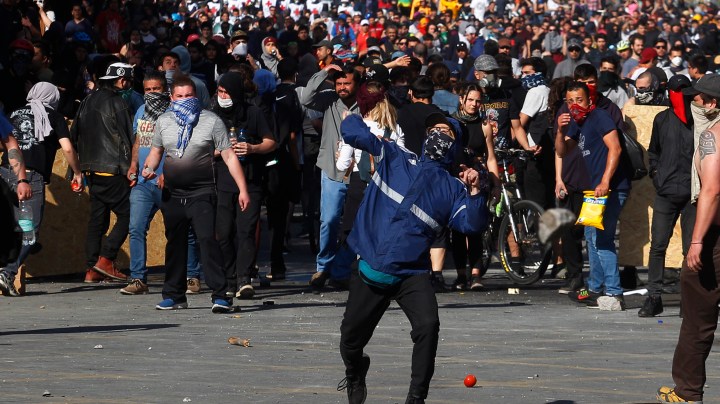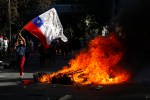Chilean Government Declares a State of Emergency as Thousands Protest Economic Inequality

Anti-government demonstrators clash with police as they protest against cost of living increases on October 20, 2019 in Santiago, Chile. Photo by Marcelo Hernandez/Getty Images
Protests erupted in Chile over the weekend as demonstrators rallied against a now-reversed subway fare hike and the rising cost of living in the South American country.
Clashes between demonstrators and authorities have resulted in at least 11 deaths and thousands of arrests. Interior Minister Andrés Chadwick said there have been more than 70 “serious events,” with multiple cases of looting and burning buses and buildings.
The government has declared a state of emergency and imposed a curfew in Santiago, the country’s capital, as well as other major cities. According to The Washington Post, it’s the first time since the end of the Pinochet regime in 1990 that the Chilean government has called the military onto the streets of Santiago.
“We are at war with a powerful, relentless enemy that respects nothing or anyone and is willing to use violence and crime without any limits,” President Sebastián Piñera said late Sunday in an unscheduled talk from the military headquarters.

Protesters, however, say that the economic inequalities that have pushed thousands to demonstrate have been brewing for three decades under the country’s repressive military dictatorship.
While objectors first organized to protest a transit fare hike, which the president has since canceled after imposing it two weeks ago, they remain demonstrating against stark economic disparities in the country.
“This was an economic pressure cooker that’s been building for decades, and it exploded,” Rodrigo Booth, a professor at the University of Chile, told the newspaper. “This had little to do with public transit. It became a situation about brutal inequality.”
While Chile’s neoliberal policies have made it one of the wealthiest South American countries, its push toward privatizing public services has negatively impacted the country’s poor and middle class, putting many in debt. Basic utilities, like water, highways and the pension system, have been privatized.
The president’s language during the massive resistance, particularly calling protesters criminals and blaming them for clashes with military forces, has also enflamed those on the streets. The government has deployed more than 10,500 officers to the ground and there are reports of more than 1,400 arrests.
Protests don’t appear to be slowing down. On Monday, many banks, schools and shops remained closed while at least two airlines canceled or rescheduled flights into the capital.